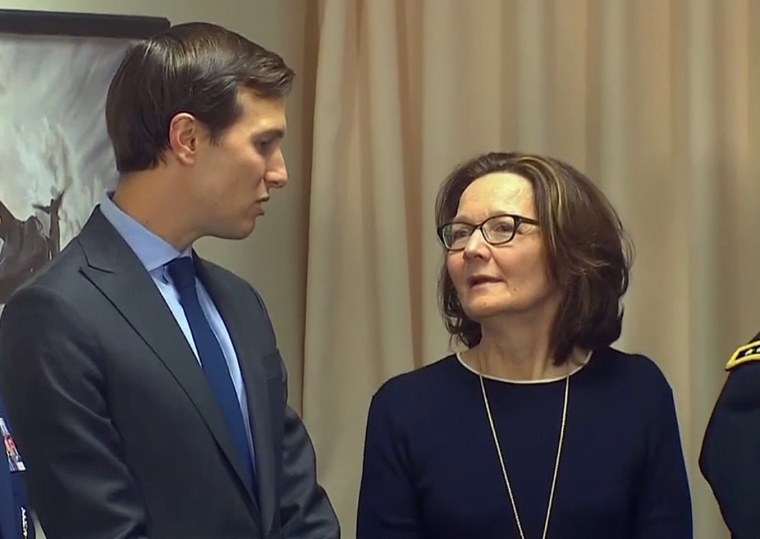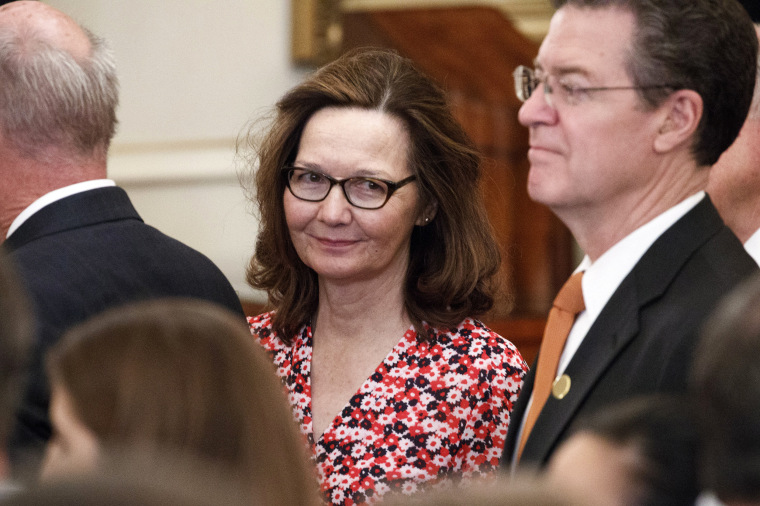Nearly 17 years ago, as Americans were watching images of the World Trade Center towers collapse and smoke rising from the Pentagon and a Pennsylvania field, a mid-career CIA officer named Gina Haspel walked into the agency’s Counterterrorist Center, turned on her computer and went to work. Trained in operations, Haspel was respected by her colleagues for being soft-spoken yet direct, confident yet humble, and committed to the mission of the CIA in those harrowing hours after 9/11: preventing another catastrophic attack on the United States.
Haspel is now the nominee to lead the CIA, the first woman to be so nominated but, more important, the first career CIA officer to rise directly to the post since Richard Helms was confirmed 52 years ago.
Haspel has served as agency's deputy director for the past year, having previously served in senior roles in the directorate of operations and as chief of station in a major allied capital. During the years after 9/11, she worked on a range of sensitive counterterrorism missions. Quite simply, she is among the most qualified people ever nominated to lead the CIA.

In 2007, I was serving as the Democrats' chief counsel to the House Intelligence Committee, and as such was assigned to investigate the destruction of videotapes by the CIA documenting the interrogation of two suspected Al Qaeda operatives. We looked at Haspel’s role in that decision. She was serving as chief of staff to CIA Director of Operations Jose Rodriguez when the tapes were destroyed in 2005. What we found was that Haspel was not depicted on the videotapes and that she did not make the decision to destroy the videotapes. At the request of Rodriguez, she drafted a brief cable directing CIA officers in the field to destroy the videotapes. Rodriguez sent the cable to the field; Haspel believed Rodriguez had the legal authority to do so.
But importantly, Haspel believed that Rodriguez was going to seek the CIA director’s permission to send the cable. While Rodriguez had the legal authority, and while I believe his intentions were honorable — he wanted to protect the identities of agency personnel who were depicted on the interrogation tapes — the decision belonged to then-CIA Director Porter Goss.
Haspel was not depicted on the videotapes and that she did not make the decision to destroy the videotapes.
The investigation by the Intelligence Committee was soon overtaken by a criminal investigation by George W. Bush’s administration. The Justice Department assigned a respected assistant U.S. attorney, John Durham, to lead it.
Later, under President Barack Obama, the Durham investigation expanded to review whether any CIA officers had committed crimes as part of the agency's program of rendition, detention and interrogation. Durham concluded his tapes investigation in 2010, finding that no laws had been broken. In 2012, Attorney General Eric Holder concluded the broader investigation and found that no CIA official should be prosecuted. This was the right decision.
The waterboarding of Al Qaeda detainees in 2002 and 2003 is indelibly part of our nation’s past, and we cannot escape it. But it is not part of our future. The issue of interrogations is now settled. Obama struck the proper balance. His administration decided it would be unjust to prosecute CIA officers who were trying to protect the country and who believed they were legally authorized to do so — but he resolved that we will never again engage in that conduct.
The waterboarding of Al Qaeda detainees in 2002 and 2003 is indelibly part of our nation’s past, and we cannot escape it. But it is not part of our future.
Even if President Donald Trump tried to reverse that policy, such interrogation techniques are now banned by the legislation authored by Sen. John McCain, R-Ariz. And Haspel has stated in no uncertain terms that she would not approve these activities today, even if DOJ said they were legal.
Our future will pivot on our ability to confront the challenges posed by Russia, China, North Korea, Iran and the ever-changing tactics of terrorists all over the world. All of these challenges require intelligence professionals willing to step forward, serve and give our nation’s leaders their best and most candid advice. We need more people like Gina Haspel.
Democrats and progressive organizations should be encouraged that a nonpartisan, professional woman has been nominated to be CIA director. Democratic and Republican Senators should welcome Haspel’s clear-eyed approach to Russia, her expertise in counterterrorism, her record of nonpolitical service and the fact that she is no crony of the president or anyone at the White House.
Confirming Gina Haspel would send exactly the right signal to the intelligence community and the rest of the country about the importance of professional intelligence and service over self. We need that signal now more than ever.
Jeremy Bash served as Democratic chief counsel to the House Permanent Select Committee on Intelligence and chief of staff at the CIA and the Department of Defense under President Obama. Bash is a national security analyst for NBC News and MSNBC.
